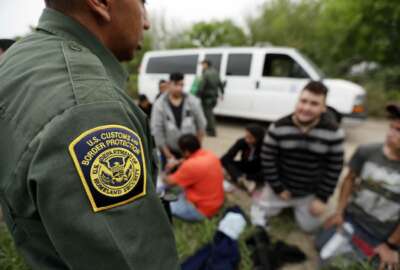
Another DHS subcomponent faces partial funding shortfall, union warns
Customs and Border Protection's Office of Field Operations faces a $400 million partial budget shortfall before the year ends. The National Treasury Employees Union...
The pandemic has created a partial funding shortfall for a second subcomponent at the Department of Homeland Security.
Customs and Border Protection’s Office of Field Operations (OFO), which relies on customs and immigration user fees to fund 40% of its budget and 8,000 of its field officer positions, may face a budget shortfall of $400 million through the end of the fiscal year, the National Treasury Employees Union told House members Tuesday.
CBP OFO may need at least $1.5 billion in fiscal 2021 appropriations to cover a projected user fee shortfall through the next fiscal year, Tony Reardon, NTEU’s national president, added.
He urged Congress to pursue additional CBP funding now so its field officers could avoid the possibility of furloughs later on.
“Without supplemental appropriated funding to support these CBP officers between now and the end of fiscal 2020, we are gravely concerned that this loss of user fee funding will result in furloughs at a time when this workforce is most needed to facilitate the flow of legitimate travel and trade as the economy recovers,” Reardon told the House Homeland Security Subcommittee on Oversight, Management and Accountability.
The funding shortfall only impacts a portion of the agency, though the Office of Field Operations is the largest CBP component.
Under the Consolidated Omnibus Budget Reconciliation Act (COBRA), CBP collects immigration inspection fees to cover the costs of processing certain land, sea, air and rail shipments and carriers. Trade and travel volume is down during the pandemic, leading to the multi-million dollar partial funding shortfall.
NTEU isn’t aware of any timeframe for employee furloughs and said they don’t seem imminent.
The CBP scenario doesn’t appear quite as dire as the ongoing situation at U.S. Citizenship and Immigration Services, where 13,400 employees may face administrative furloughs later this summer if Congress doesn’t appropriate additional funding before the end of July.
Unlike CBP, USCIS is largely a fee-for-service agency, meaning it relies on the revenue it collects through work and visitor petitions and citizenship applications, for example, to keep the organization running.
Rep. Dan. Crenshaw (R-Texas), the subcommittee’s ranking member, urged Congress to “get creative” to address DHS funding shortfalls and avoid employee furloughs.
Everett Kelley, national president of the American Federation of Government Employees, which represents USCIS employees, reiterated “in strongest possible terms” for the need to provide the agency with additional funding in order to avoid furloughs.
Kelley, however, said he’s looking for more clarity on how USCIS would use additional congressional appropriations to avoid employee furloughs. The agency told the union on one occasion it planned to use a large portion of the emergency appropriations on paying its contractors, Kelley said.
“We want to make sure that if the supplemental appropriation is granted, that it be conditioned on it being spent at least in part to ensure that there be no furloughs of any of USCIS’s federal employees,” he said in his written testimony.
Unions relatively positive on DHS efforts to keep employees safe
The subcommittee only convened for an hour, but at least two of the unions who briefly testified spoke relatively well of DHS and its efforts to protect employees, agents and officers in the field.
“We’ve had actually a pretty high level of discussion with CBP,” Reardon said. “We’ve talked to DHS on a weekly basis. We’ve dealt with Angie Bailey, the chief human capital officer, every week. We’ve had engagement with her and also just directly with acting Commissioner [Mark] Morgan, [who] I’ve personally met with on a couple occasions.”
Brandon Judd, national president of the National Border Patrol Council, said the way the Border Patrol has approached health and safety precautions for him and his colleagues should serve as a model for other agencies both in the field and office settings.
“From a health and safety perspective we have generally fared well and have been incredibly fortunate that the number of COVID-19 cases among agents has thus far been low,” he said. “The men and women of the Border Patrol have been able to continue border security missions while also protecting our agents with little to no disruptions. With the Border Patrol as an example, the federal government can operate at high levels while also managing the spread of COVID-19.”
The Federal Law Enforcement Training Centers (FLETC) are requiring students to come to campus 14 days before the beginning of classes at the agency’s classrooms, firing ranges and other facilities. FLETC plans to test students for coronavirus twice during that two-week period, and it installed plastic barriers at service centers, temperature check kiosks and other signage to encourage social distancing.
The agency will ask employees and other students to fill out health questionnaires and take their temperatures upon arrival to FLETC entrance gates. Regular coronavirus testing, however, isn’t necessarily an option for FLETC employees.
“They’ve certainly put together a plan,” Reardon said of FLETC, where NTEU also has members. “One of the concerns that I do have, however, is you have staff going home, and they’re going out into the community and then they’re coming back in. It seems to me that it would be appropriate to ensure they’re being tested as well.”
The Border Patrol isn’t testing agents for coronavirus either, Judd said. He encouraged the agency to establish in-house testing capacity or contract out for those services. Masks and other personal protective equipment, however, haven’t been a problem for the Border Patrol.
“They gave us plenty of PPE,” Judd said. “We’ve been able to protect ourselves, as well as those individuals who we come into contact with. If this is what has been done department-wide then we’re in a very good place.”
Copyright © 2025 Federal News Network. All rights reserved. This website is not intended for users located within the European Economic Area.
Nicole Ogrysko is a reporter for Federal News Network focusing on the federal workforce and federal pay and benefits.
Follow @nogryskoWFED




